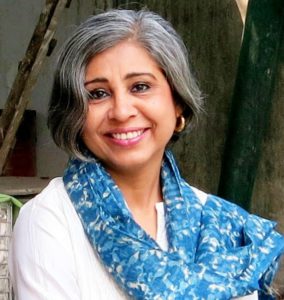Urmi Basu set up a small nonprofit named New Light in Kolkata in 2000 with a seed money as little as Rs 10,000/- along with two other young people from the Kalighat red light district. Today, New Light is a comprehensive community development project that provides shelter, education, health care, nutritional support, HIV care and the opportunity to live a life free of abuse, violence and stigma to more than two hundred children of sex workers and a couple of thousand people in the Kalighat red light district. Urmi was also featured in the documentary Half the Sky: Turning Oppression into Opportunity for Women Worldwide based on the novel by New York Times columnist Nicholas Kristof and Sheryl Wu Dunn. She lives in Kolkata, India and fights for social justice for the marginalized community of sex workers / women in prostitution and survivors of trafficking every day of her life.
Tell us more about your childhood. What were your dreams and goals? You credit your parents for raising you with a great deal of freedom and a strong sense of social responsibility. Tell us about how your parents inspired you.
Most people would naturally credit their parents for making them who they are. Looking back at my life, I feel very lucky to have been born to parents like mine. If you know the distinction between somebody being from now West Bengal and now Bangladesh, say across the country divide, before the two countries existed, culturally, they came from very different orientations. My grandfather was a British Military Officer. He was a Gandhian. My father spent his early years in Nagpur and went to Fergusson College, Pune for his further studies. My grandfather set up a Harijan school in our family home in Nagpur. The fact that we would do socially relevant and responsible work, and be driven that way, it’s not really unexpected. It would be kind of unusual if I did not do the work or live the life that I did.
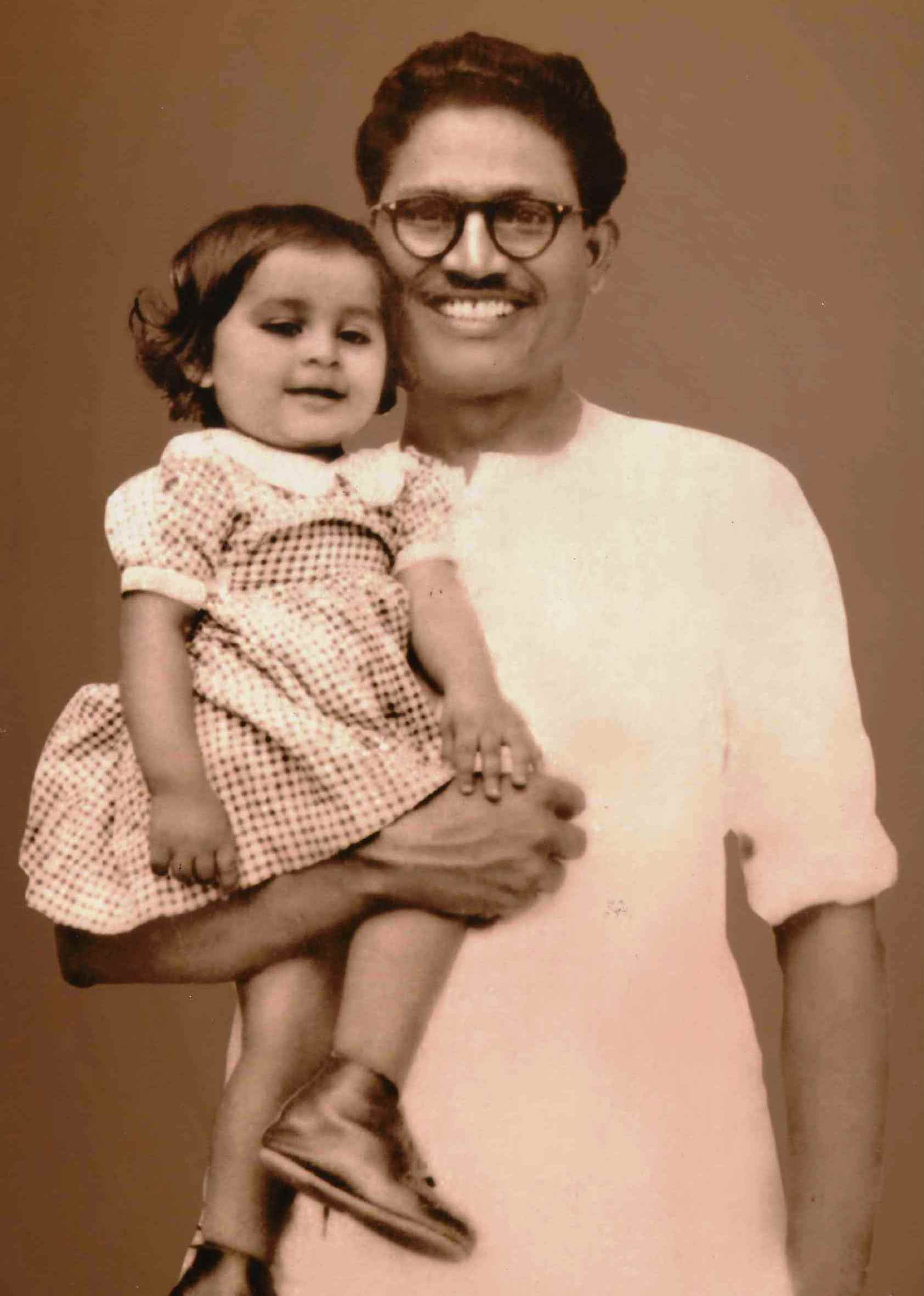
Urmi as a child
My earliest memory of my parents being activists was when the communal riots broke out around 1964. I have very faint memories and most of it was reinforced by the stories I heard from my family members. I knew that both my parents had gone out and saved many Muslim families, give them housing. My father went out and treated many of them and protected them. Bakeries were burnt and their clothing shops were completely ransacked and looted. So it was something I have always grown up with and that is why, it wasn’t unusual.
In my childhood, I wanted to become an artist, a designer, because art is something that keeps me grounded. It is my life force. For me, justice and beauty are the two most important tenets on which I hold my life. I did have the possibility of joining a very prestigious art and design school. But it didn’t work out that way. By the time I was 16 or 17, I knew that this is what I wanted to do. I was very focused about it. I went on to get a degree in Sociology, but about the next step I wasn’t very sure. But, by the time I was completing my graduation, I knew that I wanted to go ahead and do my Masters in Social Work from the Tata Institute of Social Sciences.
When I was a student doing my internship in Mumbai, I had got the chance of visiting the red light district, Cursetji Shuklaji St., Grant Road in the Kamathipura area. So I was fairly familiar with the trade as such, but trafficking in the way it presents itself, came to my knowledge and understanding years later. It was in 2000 when I first presented a paper in Australia, in Adelaide, in the International Youth Conference. I was talking about how young children are abducted and used in trafficking and to what extent, and also how it is so closely related to poverty. Unless, we address issues of poverty and social alienation, we cannot tackle this massive problem. It’s been 15-16 years that i have been closely associated with this work and this issue has now become central to my existence.
How does your organization, New Light, promote gender equality? Please give us some examples.
As you can understand from our vision statement, our fight is to create a more gender equitable space, and it has been more so for a community we work with where women, though basically they are service providers, are really at the bottom of the ladder. And nobody actually talks about the social inequalities that exist at that level. It is really a fringe community. People don’t really consider that children born in those areas deserve equal opportunities, and they need to have equal freedom of expression. Our conversation about gender equality began years ago. We never separated the girls from the boys and said that we’re only going to work with girls.
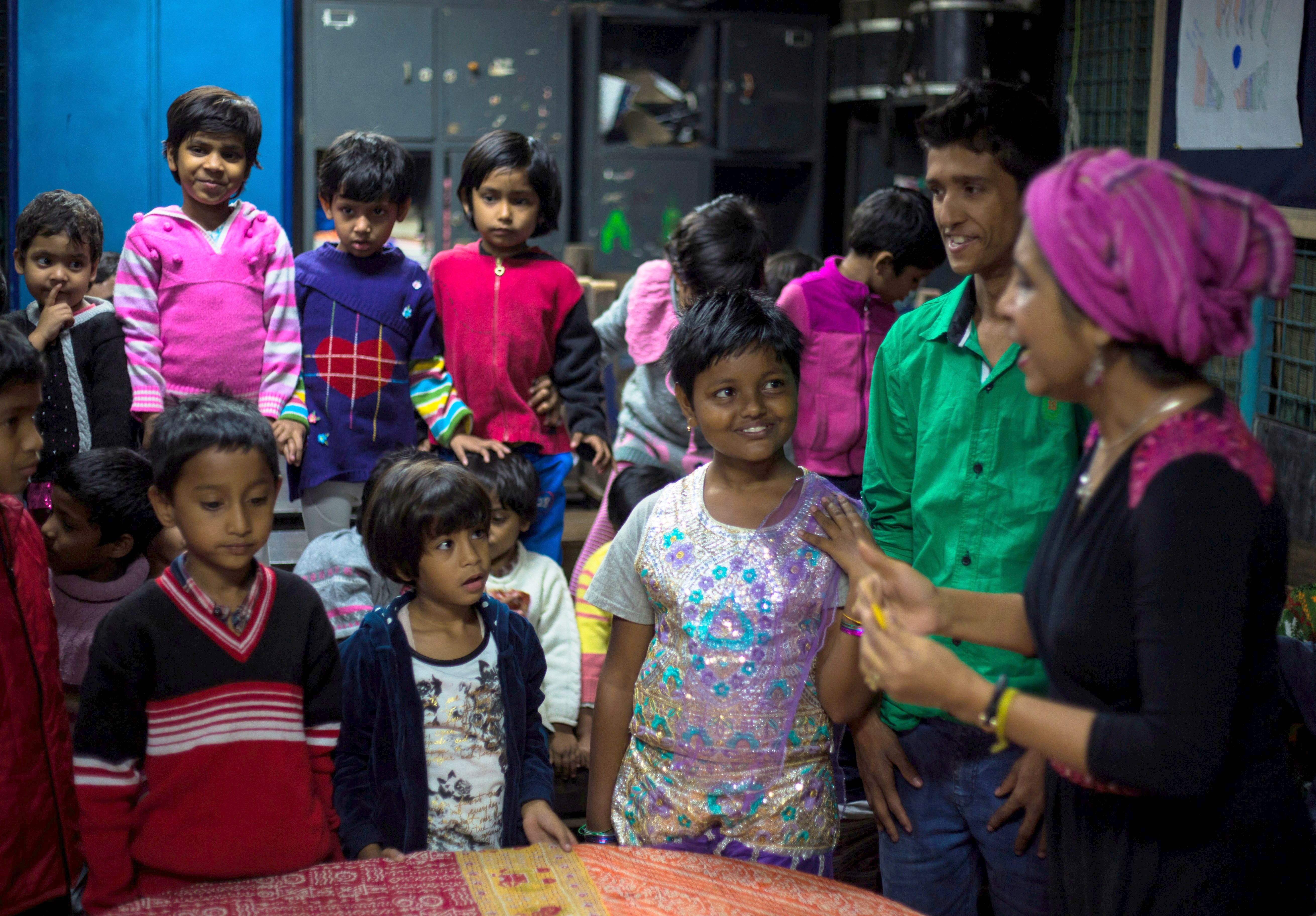
Urmi Basu with the children at New Light
Today, UN Women’s campaign is HeForShe, but we’ve been talking about it for a long time. Unless we bring the discussion of gender equality to the boys, we will not be able to create an abstract form of equality.
We have extended group discussions with the boys. We are constantly talking to them about why their mothers do what they do, that they did not really choose to be where they are. They are in that situation because it’s not a gender equitable society, and that is one form of existence that is so intrinsically linked to your gender, in this country especially, because there’s very little talk about male prostitution.
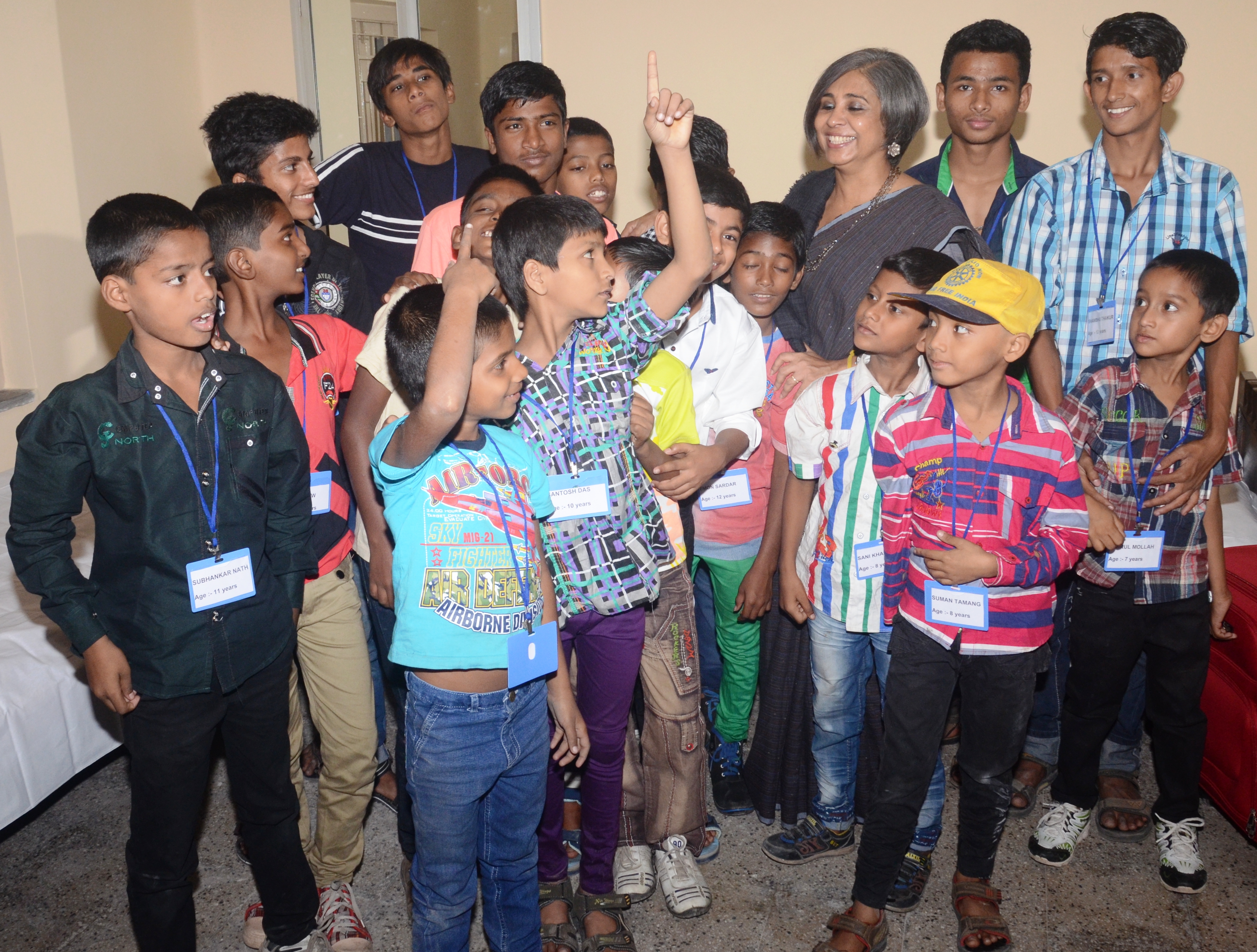
Urmi with the boys of New Light
The moment you call any person a ‘prostitute’, you already have a predetermined gender to that word. First thing you think of is a woman. And all the abuses that are sexually loaded, or loaded with physiology, all those are about female genitalia. All those words are about female existence and procreation. Sex, which is the most important and ordinary aspect of our lives, becomes something that takes away the being of a woman when she is a provider of sex.
This is how our conversation goes on. Then, we’ve successfully done the Nirbhaya campaign which was our call. ‘Nirbhaya’ is just an expression. A lot of people have asked us, “Why this name? Why not that name?”, but the idea is to not just get caught up in rhetorics but actually do something. The name has to create a sensibility, a force, a power, that would be able to dismantle the structure of patriarchy, and that has to happen at every level. We needed a symbol. And ‘Nirbhaya’ became that symbol.
In general, what are the major challenges and problems you face(d) with your organization and how do (did) you overcome them?
The first big challenge was to convince the mothers that a different life was possible for their children, and that they could actually go to school and be sustained with support for education year after year, that they would have opportunities good enough to go and attend schools and take benefit of all the other services that the budget was willing to offer them.
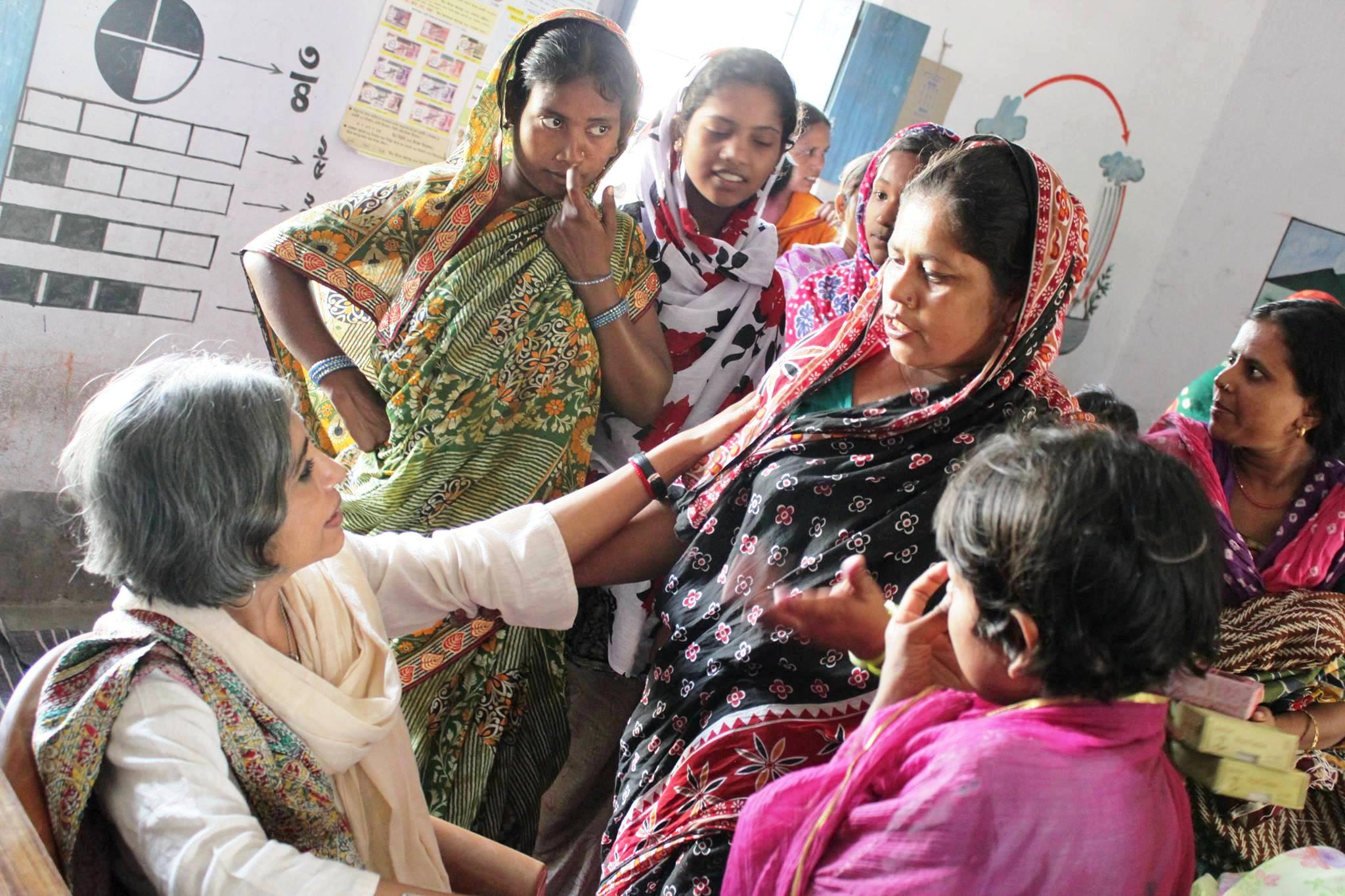
Urmi Basi with the mothers of the community
Second challenge was to find competent staff. People would come, talk to me, give interviews, and when they were told that they were actually required to work in the red light district, and they’d have to spend 8-10 hours inside the brothel, they would just not come back, or even return my calls. Later, we did find a huge number of young people who were really interested, very committed women but their families weren’t allowing them to come and work in the red light district.
Finding the right staff is a very big problem, even today. Finding qualified people and retention of qualified staff with salaries that are commensurate with any other job in the city is a big challenge. Why should a young person who can get a package of say 12 lakhs Rupees a year at an advertising firm work as a social worker for some 2 lakh Rupees per annum, doing a job that would require a lot of energy and challenge them to do the most difficult and bizarre things.
Convincing people to work for New Light happened gradually. Since New Light became quite a name, and people come to work with us because they support the project and they are completely convinced. Money is no longer an issue among the staff. Of course, it would do them a great deal if they earned a little more money, but that is not what drives them. As a team, this is what they believe in and they know that this is what they want to work for. I am very pleased and deeply appreciative of this.
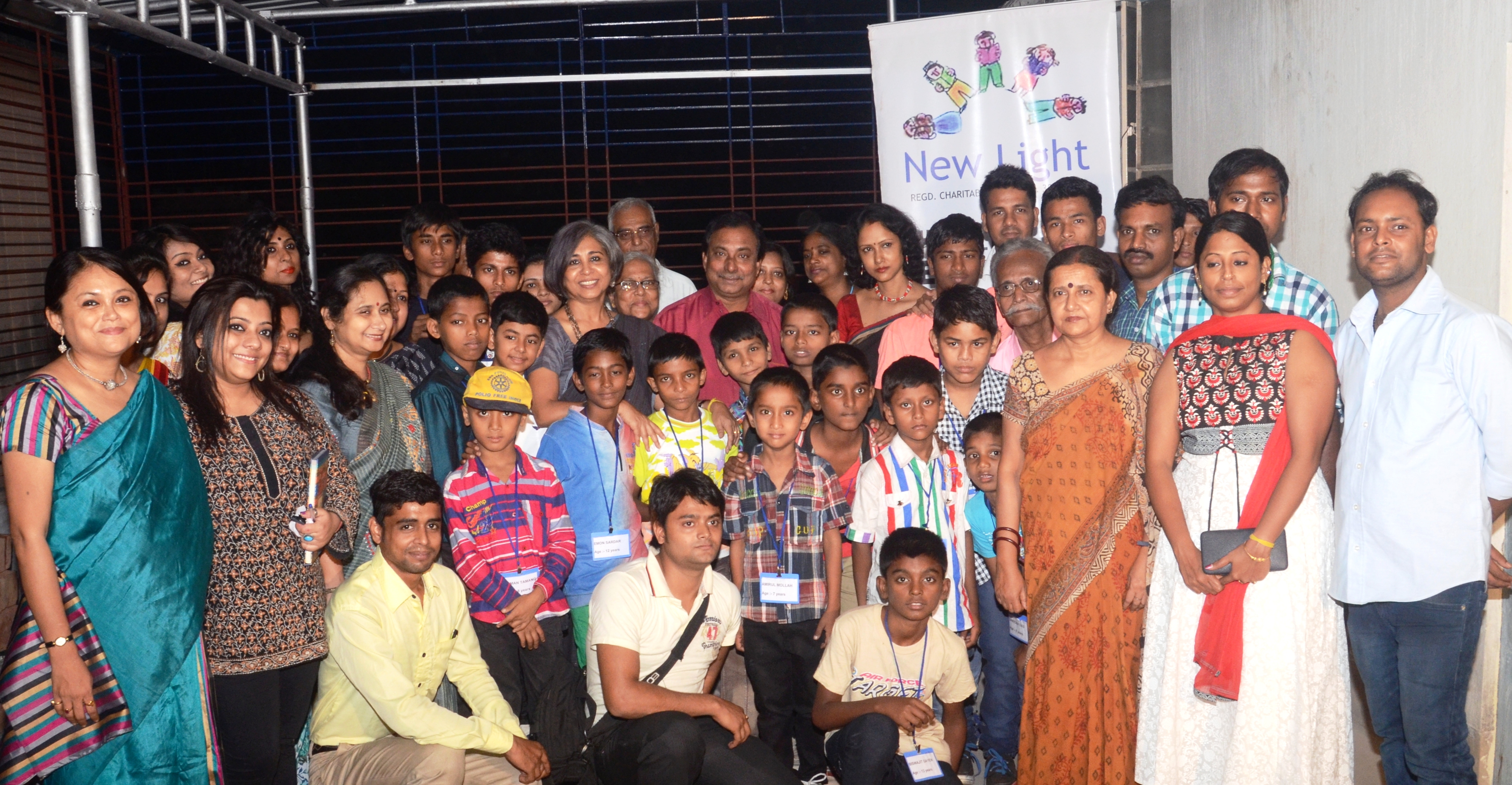
New Light Team Picture
Funding is always an issue. We started with 8 children and we now have more than 250 children and 1000 people in just the immediate extended community, reaching out to 5,000 to 10,000 people and making sure that all of them are listed and reached, requires a huge amount of money. We started with an evening crèche in Kalighat and now we have three full residential centres and four stand alone projects and multiple outreach programs. We have income generation programs. So, it’s a lot of work.
New Light is a community development project located inside the Kalighat red light district of Kolkata, where girls are at risk for induction into prostitution. Talk about it’s (location) advantages and disadvantages. For example, you mentioned that the location hinders volunteer participation and hiring staff at New Light. Sunitha Krishnan talks about constant threats from the mafia. Have you had similar incidences?
The advantages far outweigh the disadvantages.
The biggest advantage is that it’s the location that has made New Light the project it is, because the mothers never even have to cross the street to bring their kids to the center. If they want to access medical care, all they have to do is to walk up a flight of stairs. When we began, we had absolutely nothing. This project had no blueprint, no consultation with any experts, it had no guidance. Till date, we haven’t taken even 25 paisa from any government or agency.
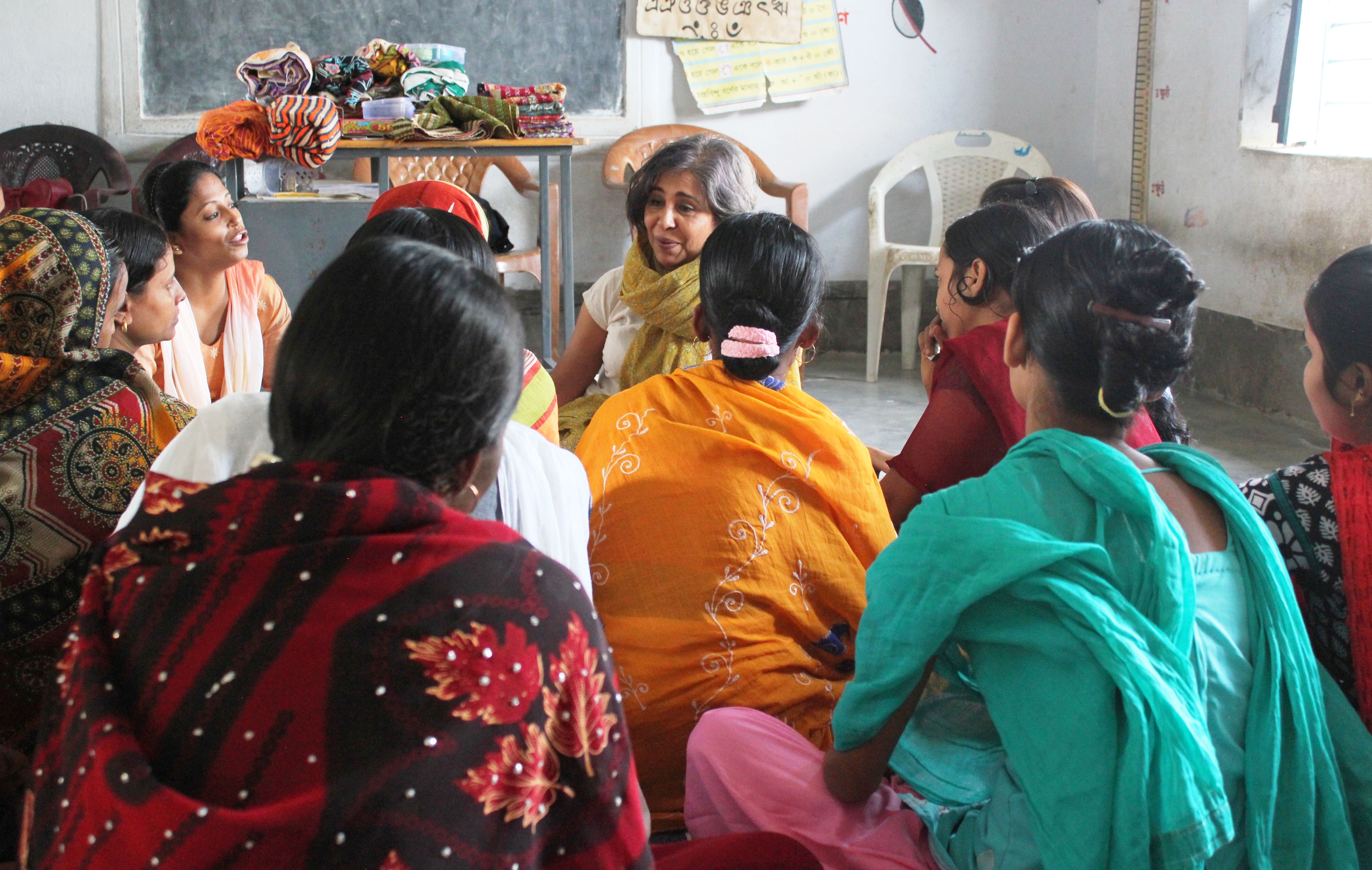
Urmi Basu empowering women
And it has been mainly through word of mouth. People have come voluntarily and donated their time, money, belongings and their skills. Then we gradually found donors within the country. From friends and family, it became within the city, then within the country, and then internationally, a lot of people and foundations have come ahead to extend their help.
The location is, in a way, also a disadvantage. In this weather, we get flooded twice a day for 6 days, and the water rises up to the chest level. If you have seen The Telegraph last weekend, there were photographs of school children wading through flooded streets of Kalighat, that is what the status was of the downstairs. How can you pretend to be talking about education with people who don’t even have the basic necessities of free citizens of a free country?
I mean I could be a young woman trying to survive being a prostitute, raising my two and a half month old baby, and I don’t even know where to keep my baby safe. Is that the life we want? There is a complete lack of social security, complete lack of dignity as a human being. I always say that, “Let’s restore people’s dignity first before we can try to talk about what’s the literacy percentage. I don’t even give a damn about that. Let’s treat people as human beings first.” Monsoons cause damage not just to property, but also to livelihood, lives and safety.
Yes, I have had threats made to me a couple of times. I don’t get overtly concerned because I have had exposure to extreme violence when I was very young. At the age of 9, our house was burnt down; my father was stabbed in three different places on his body, bleeding and hiding. We lost everything. So, those kinds of threats don’t really work for me. I’m sure it throws you off for a while. And what can happen at most? I will die, that’s it. Finished. I could get knocked down by a bus at the corner of my street and lie in a coma for 30 years, or I could just die on the spot.
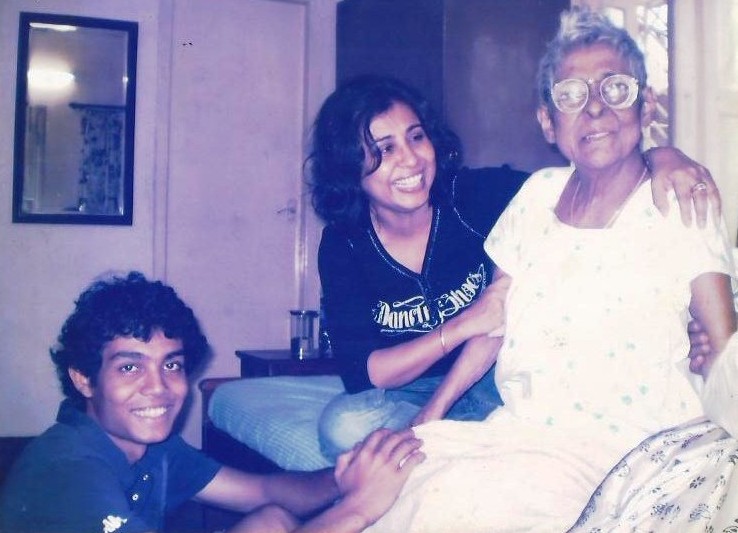
Urmi Basi with son and mother
Share with us some of New Light’s success stories. Where have some of these children/women landed? What do you aspire for these children? What kind of support/funding do you need for your developmental programs?
I think our entire work of the last 15 years and maybe another 10 years would be fully justified the day we can say we are shutting shop. Imagine a time when all 200-300 children from the area, an entire generation from 0-25 years, everybody has been to school, everyone has received good nutrition, everybody has received vaccines and are immune to preventable diseases, knows the perils of unsafe sex, knows the perils that lurk in the street corners where you might get trafficked and the mothers have some kind of aspiration about their children living a different life. So, that would be an ideal situation in an ideal world, where we don’t have to operate anymore. But, given the complexity of the situation or the reality, it is going to take a couple of generations because we are constantly fighting inter generational prostitution where a mother looks at her daughter as her insurance. As soon as she is 35-40 and has a 15-16 year old daughter, she very easily assumes that this girl will look after her and because they don’t have other ways of realizing their avenues, she thinks, yeah, she could do the same thing as I did. It is going to be a couple of generations and above all you also have the human element, you can only bring people the services, guide them, show them the light but whether they are willing to walk towards that light and what they want to do ultimately is their decision because in our teaching of social work, one of our most important principles to keep in mind is “the ultimate thing is the client’s self-determination.” You always have to honor that.
As for success stories, there are plenty. As of today, as we speak, two of our girls, both of them survivors of trafficking, are working in an all women’s HPCL petrol station. One other girl working at a super luxury hotel. She did her graduation, then she did her Master’s in Hospitality Management and it is beyond my capacity to go and spend one night in that resort that’s all I can tell you. One of the kids from our first batch of students is working at Park hotel in Kolkata. One of our boys is in a well-known computer graphics school, BITS in Delhi and we have a number of students getting nursing training. A bunch of kids who have graduated and they’re holding different jobs. Five of our graduates are actually working with us, one in accounts, two work in our office management and two are teachers and one finished her Masters in Social Work.
This works as motivation for younger mothers to bring their children into the program.
Tell us more about trans generational prostitution. What are some of the ways to combat trafficking and break the cycle of prostitution? In your opinion, should prostitution be legalized-and-regulated or prohibited?
I think jettisoning them out of that poverty and out of that situation of cycle of violence and exploitation by using education as a tool. You need to create real and achievable examples. The goals and aspirations should be achievable and very relevant and real. You cannot talk about achievements and role models in abstraction. It has to be very close to their own lives, it has to be happening to their friends, to their neighbors, to their family.
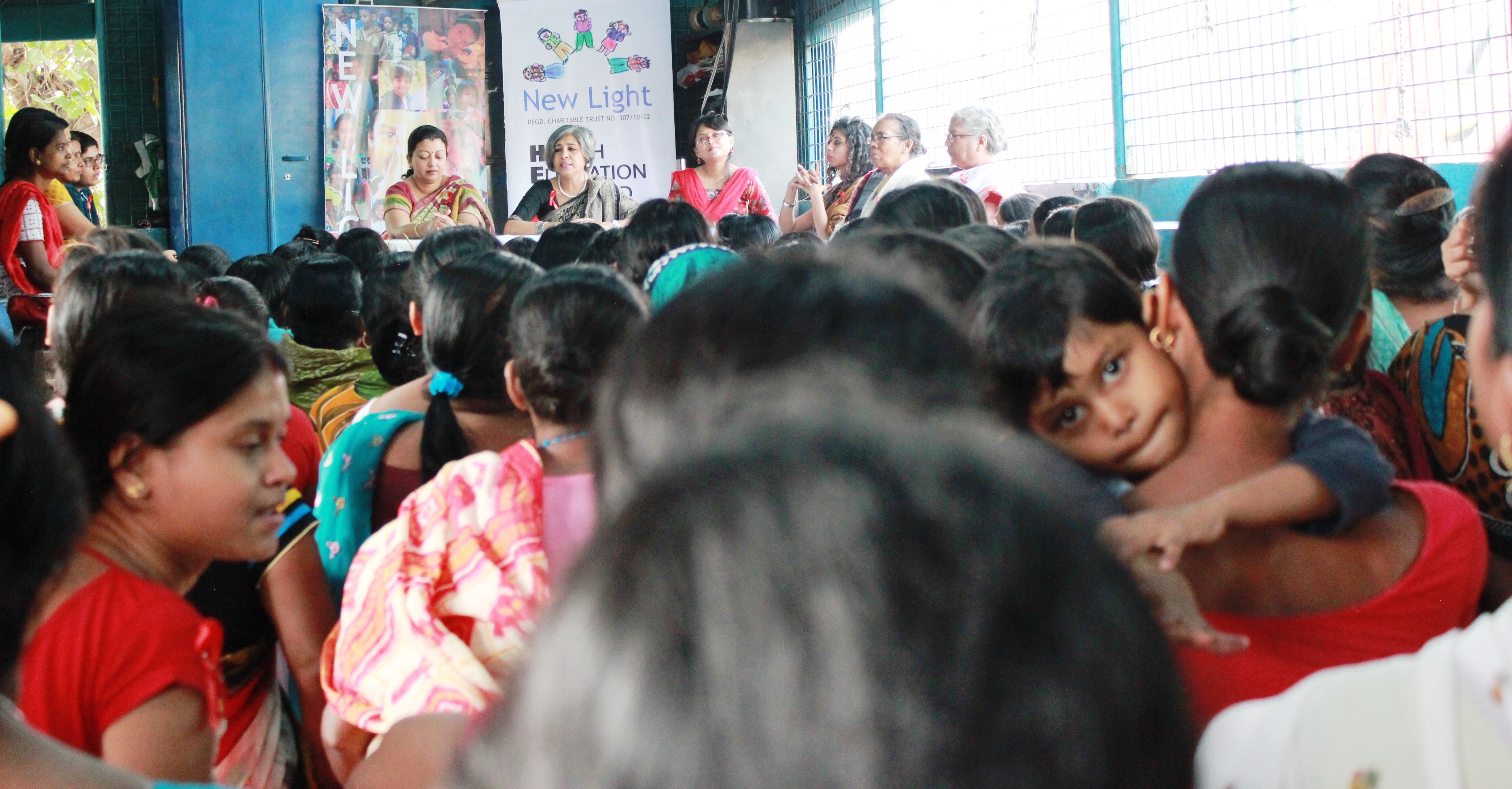
Urmi at a mother’s meeting at New Light
We are completely against legalization of prostitution. New Light, as a group, and I as an individual. Because in my belief nobody anywhere on this planet should be selling his/her body for survival.
Our society still stigmatizes prostitution and people who are associated with it in any form. Do you have stories to share from your own personal life where you had to fight with your family to continue doing the work you were doing. What is your message to we the people?
Of course, I walked out of my second marriage because I was at a stage where I had to make a decision between my marriage and continuing my work. It can’t get any more real than this.
We can change the attitude of people by having a conversation everyday, everywhere. That it is an issue of human dignity and no one should be living in this state. It’s about freedom, justice and dignity. We the people need to do our bit in our own small spaces. To disregard these women and their lives would be a very wrong thing to do.
As far as these women are concerned they are not really bothered by what the society thinks of them. They are wonderfully calming and accepting individuals. Of course in their initial phases they were angry and very aggressive but over time many have accepted and resigned to their fate. It comes from our thousands of years old belief that one is living their life because of their karma. So many women have accepted it that they were meant to do this without ever challenging it.
What is your idea of an empowered woman?
An empowered woman will make all her decisions on her own; whether she wants to earn money, how she wants use her money, how she wants to get her education, how she wants to raise her children, whether she wants to have a man or a woman in her life, or nobody at all. That’s my idea of an empowered woman.
Sayfty’s mission is to Educate, Equip and Empower women so that they can protect themselves against violence. What is your message for our readers related to women’s personal safety and the issue of violence against women?
We would be limiting ourselves if we only say women. We need to talk about gender-based violence because it can also be meted out to a gay person, lesbian, any kind of gender-based violence has to be protested against and we need to create safe spaces for all of us.
India, in the strangest of ways, has always been a country, a culture that has revered women, has placed women in the highest places of respect, but has never really understood what a woman wants or who she wants to be. To keep our women safe, our next generations safe, we need to create a conversation that is gender-neutral.
I wish Sayfty a very positive future. You can achieve what you set out to do. More power to organizations like yours.
Bio
Born and raised in a family of professionals in Kolkata, India, Urmi Basu received her primary and secondary education in the same city. Her father was a doctor and her mother a healthcare administrator. Both her parents were deeply involved in activities of urban and rural development which influenced and prompted Urmi to choose the career of a social worker. On completion of her first degree in Sociology, Urmi moved to take her Masters degree in Social Work at the prestigious Tata Institute of Social Sciences (TISS), Mumbai. During her training she had the opportunity to work in the first cell set up for women in distress by the Mumbai Police Department. She also worked as a relief worker during the Bhopal gas leak tragedy in December 1984 which left a lasting impression on her mind about the need to be prepared for disasters, both natural and manmade.
In the early part of her professional life Urmi worked with both small and well known organizations involved in the developmental sector. During her career she had the opportunity to work with issues related with urban and rural economic development, empowerment and protection of vulnerable groups like women engaged in sex work and subjected to extreme violence, street children, trafficked child labourers and young people in exploited situation. She has been a part of targeted intervention programs for victims of HIV/AIDS, trans-sexual and trans-gender people.
After fifteen years of professional work, Urmi set up a small nonprofit named New Light in Kolkata in 2000 with a seed money as little as Rs 10,000/- along with two other young people from the Kalighat red light district. The mission of the organization is to promote gender equality and fight violence and abuse of women, girl children and young people. That tiny initiative today provides care and support to a couple of thousand people. The organization also works to fight against child prostitution and trafficking for the purpose of sex- trade, child labor and bonded labor. For the last many years Urmi has been a trainer and resource person for innumerable government and nonprofit organizations. She regularly presents papers at various national and international seminars and conferences on HIV/AIDS, trafficking, child rights and social justice.
She was selected as the NGO co-ordinator by the office of the Governor of West Bengal to make a presentation on micro credit, women’s participation in gender sensitivity and health issues during the visit of the former President of the United States Bill Clinton on 7th of April, 2001. More recently she was a part of the core team that met the past Secretary of State Hillary Clinton on her visit to Kolkata in May 2012 and shared the experience of working against trafficking in persons.
In November 2011, Urmi received the Make A Change Award from Children’s Hope India, New York.
In October 2012, a four hour documentary Half The Sky based on the novel by New York Times columnist Nicholas Kristof and Sheryl Wu Dunn was shown on PBS featuring Urmi and her work with the victims of trafficking. Following the documentary Urmi received the Global Citizen Award at the Global Music Festival in Central Park, New York in September 2012 which was organized to mark zero tolerance for hunger, poverty and abuse.
In March 2013 she received the Godrej Eon Woman of Substance Award at the Femina Miss India Contest in Mumbai.
In November 2013 Urmi was recognized as a Daughter Of Greatness at the Muhammad Ali Centre, Louisville, Kentucky. She was also given the Honorary Title of Colonel of Kentucky by the Mayor of Louisville in the same year.
In May 2014 Urmi was recognized for lifetime contribution to fighting against gender based violence from Sakhi for South Asian Women, New York.
In January 2015, International Consortium for Social Development recognized Urmi with an award for significant contribution to the field of social development.
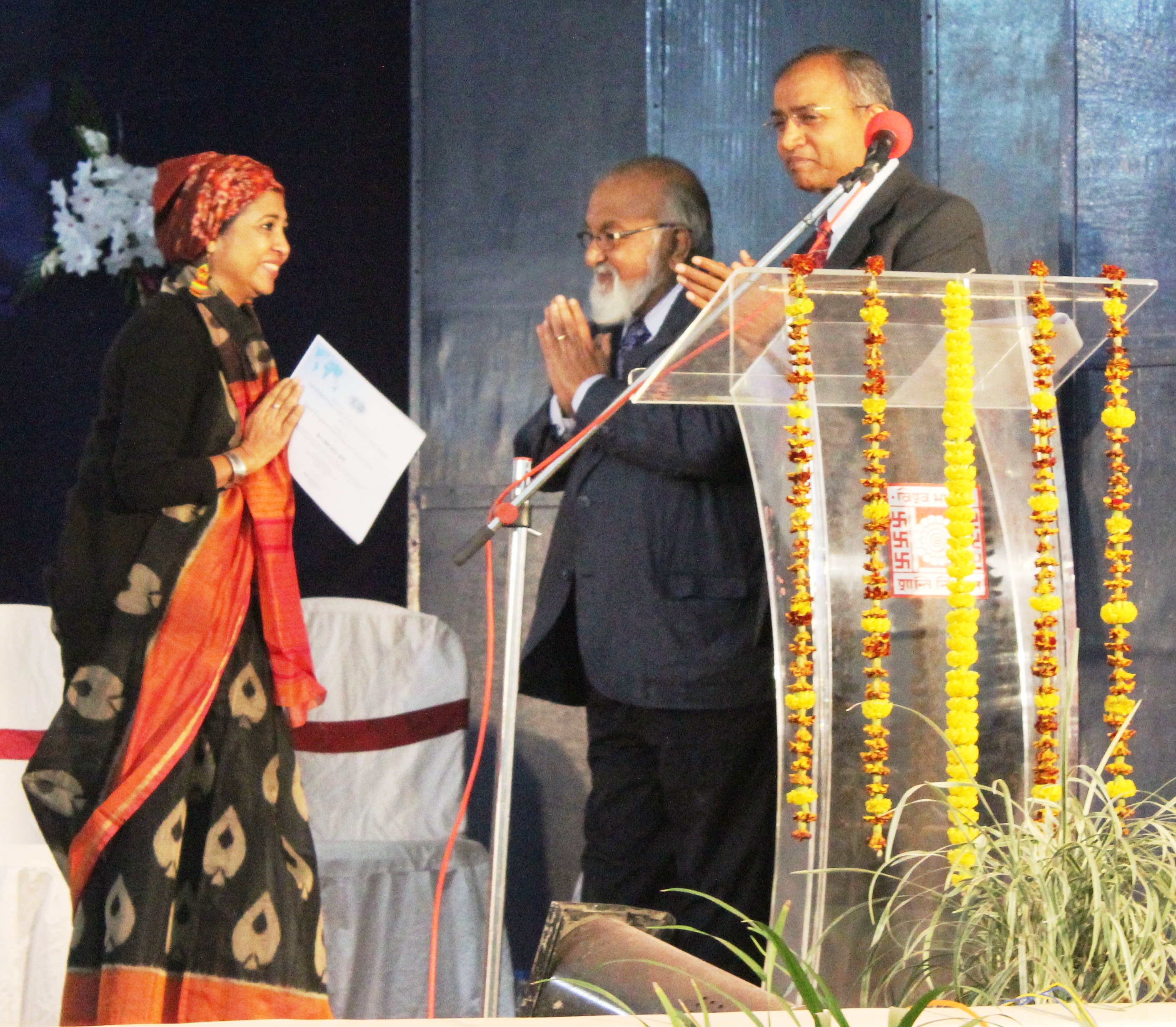
Urmi Basu receiving an award
In July 2015 Urmi delivered a talk at the prestigious TEDxCibeles event in Madrid, Spain where she spoke on fighting stigma with education at the event named Impossible.
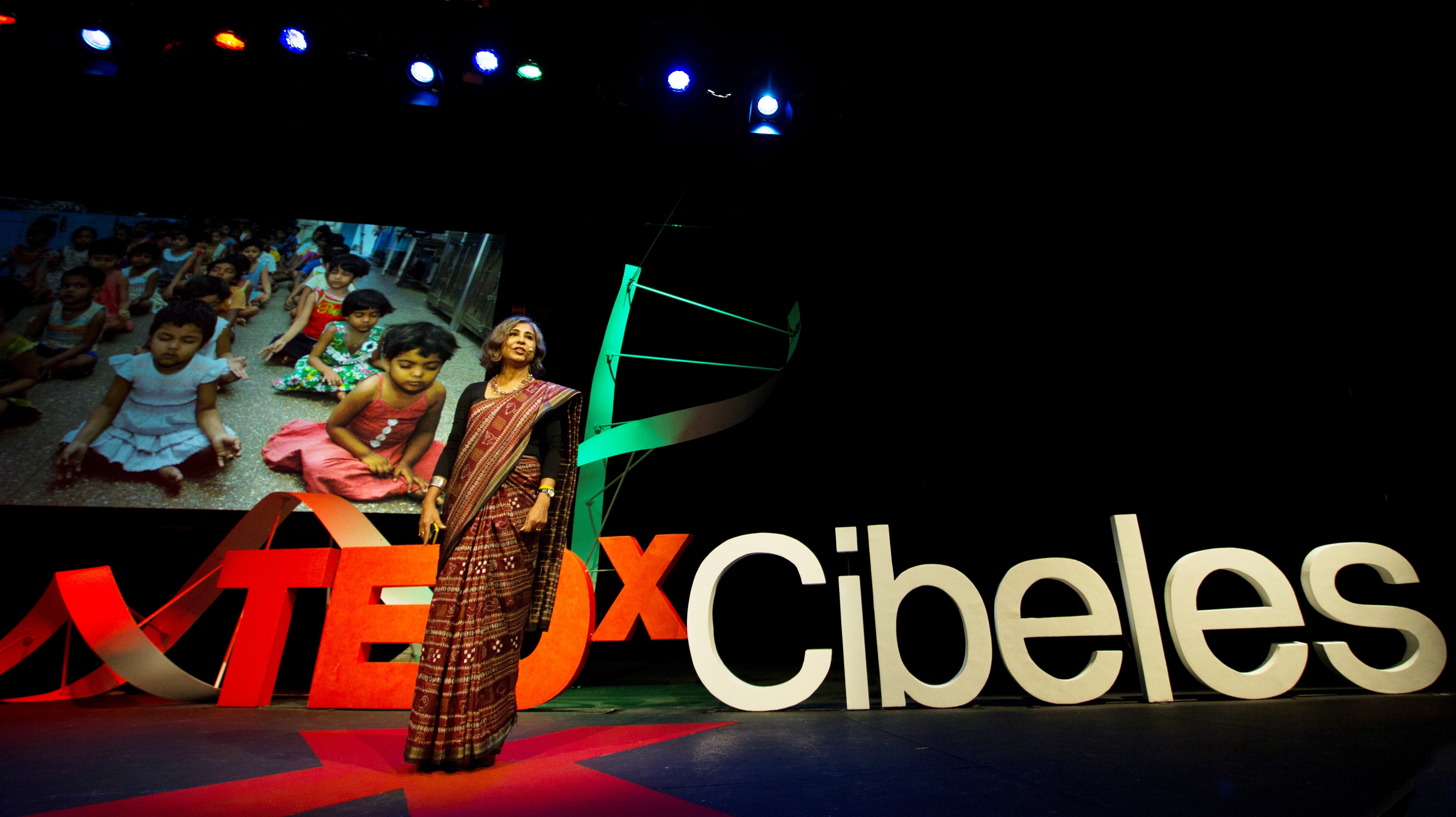
Urmi at TEDxCibeles 2015
Urmi was chosen as a recipient of a blessing from His Holiness The Dalai Lama under the title 2009 Unsung heroes of Compassion on the 26th of April 2009 in San Francisco for her work that promotes compassion and peace.
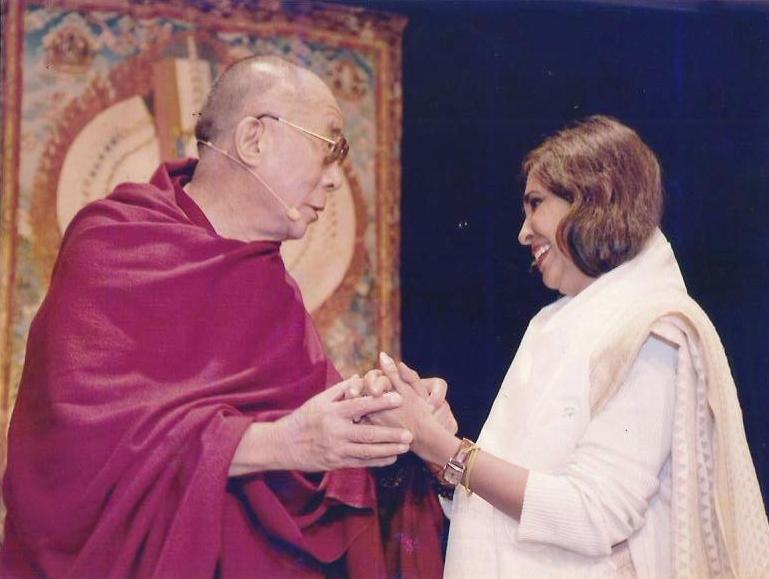
Urmi Basu with Dalai Lama
She lives in Kolkata, India and fights for social justice for the marginalized community of sex workers / women in prostitution and survivors of trafficking every day of her life.
In June 2015, New Light, launched a fundraising campaign called Sponsor a Slate and Educate a Child. Education being the primary and basic facility, New Light has taken the initiative to ensure to provide this facility to the 240 children who are under its care and support and enable each child to have a dignified and respectful living.
